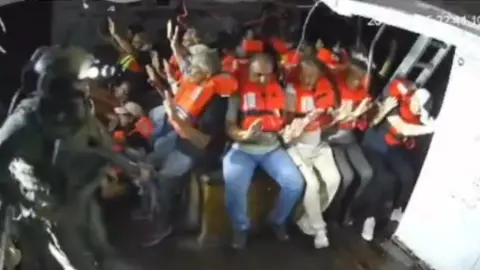In a significant event unfolding in the ongoing Israeli-Palestinian conflict, Israeli naval forces intercepted a boat named “Handala” that was attempting to deliver food aid to the besieged Gaza Strip. The vessel, associated with the pro-Palestinian group Freedom Flotilla Coalition (FFC), was reportedly stopped in international waters, prompting considerable media attention and raising tensions surrounding humanitarian efforts in the region.
According to reports from the FFC, the Handala was carrying essential supplies, including baby formula, aimed at alleviating the dire humanitarian conditions faced by residents of Gaza. Video footage shared by activists depicted scenes of chaos as armed Israeli soldiers boarded the boat while activists raised their hands in surrender. This incident is reflective of the larger issues concerning maritime blockades and humanitarian access to Gaza, exacerbated by ongoing conflicts and longstanding geopolitical tensions.
The Israeli Foreign Ministry subsequently confirmed the interception, stating that the navy acted to prevent what it termed an “illegal” breach of its maritime security—the area around the Gaza coast is subject to a strict blockade enforced by Israel since 2007, following Hamas’s control of the territory. This blockade is part of Israel’s broader strategy, which the Israeli government argues is necessary for national security, particularly given past conflicts with Hamas.
In an official statement, the ministry stressed that “unauthorized attempts to breach the blockade are dangerous and undermine humanitarian efforts,” indicating a staunch stance on their rights to enforce maritime restrictions. They reassured that all the passengers onboard the Handala were deemed safe and that the boat would be safely escorted to Israeli shores. However, the FFC countered these claims, asserting that the crew of 19 activists, accompanied by two journalists from various nations, had been effectively “kidnapped” during what they described as an aggressive military operation.
The involvement of international individuals, with activists from Australia, France, the UK, and the US, adds a global dimension to this incident, urging their respective governments to impose sanctions against Israel for its actions. Veteran activists participating in the flotilla have made repeated calls to raise awareness about the humanitarian crisis in Gaza and to apply pressure on international leaders to advocate for the rights of the Palestinian people.
This interception echoes a previous incident from June, where a yacht carrying several activists, including well-known climate activist Greta Thunberg, was also halted by the Israeli military about 185 km from Gaza. This earlier mission was intended as a direct challenge to the blockade and spotlight on the humanitarian issues in Gaza. Israeli officials at that time dismissed the expedition’s significance, characterizing it as a mere publicity stunt.
The blockade of Gaza by Israel and Egypt has been a point of contention since Hamas ascended to power, culminating in the halting of most aid and supplies to the area. Since then, humanitarian agencies and foreign governments have repeatedly criticized this blockade for creating a dire economic and social crisis within Gaza. Notably, the health ministry in Gaza has reported extensive casualties and dire conditions following the escalation of military operations, with more than 59,000 fatalities attributed to ongoing conflicts since October 2023.
Recent actions by the Israeli military, including an airdrop of humanitarian aid, was initiated only after global outcry regarding the deteriorating situation in the Gaza Strip. Yet, many humanitarian organizations, including the UN, have refused to engage with Israel’s new distribution systems, arguing it undermines key humanitarian principles of impartiality and independence.
The Handala incident serves to highlight the ongoing struggles surrounding humanitarian aid in conflict zones and the complexities involved in navigating international waters amid geopolitical disputes. It underscores the ongoing humanitarian crisis in Gaza and the amplified calls for international intervention and action to address the fundamental issues behind the blockade and the rights of the Palestinian people. As tensions escalate, scenarios such as this demand attention from the global community, highlighting the urgent need for dialogue and resolution.












